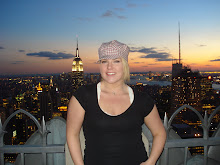One assignment from Friday was to discuss how "The Idea of Order at Key West" incorporates M.A. Abram's four elements of literary theory.
The Universe: The world is in the poem is the sea. Steven illustrates a lack of importance of the sea, calling it "inhuman" and describing the fact that it cannot form a voice like the singer's. "But it was she and not the sea we heard."
The Artist: The artist, obviously, is the singer. By singing, she becomes the creator, underlining the creation myth present throughout the poem. "It was her voice that made/ The sky acutest at its vanishing." By being an artist, she is, by default, also a creator.
The Work: The work of the poem is the song itself that she sings, the world that she was able to create with such a song. "Knew that there was never a world for her/ Except the one she sang and, singing, made."
The Audience: The last element would be the audience which is us, the readers. Wallace turns the I(me) into a "we". We are all together listening to the creation of the song by the sea. "Whose spirit is this? we said, because we knew. . ."




